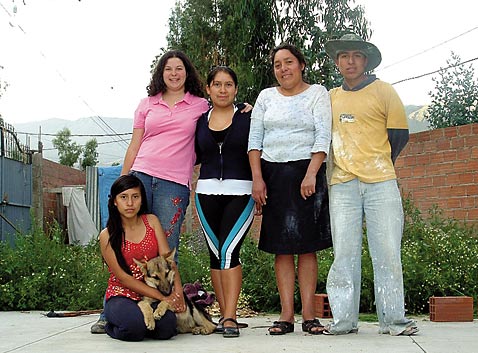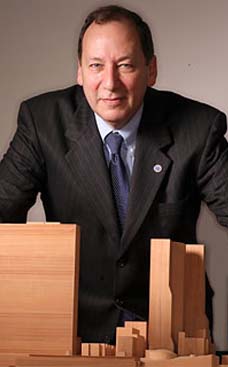
There's an interest in bees, animal-raising (especially chickens and pigs), transformation of products, cooking (I can't wait to start a cooking club!), fish farming, nutrition, and basic medicine. Malnutrition and diarrhea are huge problems. Hopefully, I can help change this. I love the people. They are all so welcoming. I played basketball every night I was there. It's just as huge as soccer there. I'm stoked, 'cause I'd take basketball over soccer any day.
Cindy Ann Oursler experiences life of Peace Corps in Bolivia
Local woman experiences life of Peace Corps in Bolivia
Caption: Peace Corps volunteer Cindy Oursler, standing at left, with her host family in Cochabamba, Bolivia. The others are Vanessa, seated, Sylvia, middle, mother Dona Asteria, Armando and the family dog, Rambo.
(Editor's note: The following was written by Cindy Ann Oursler, a Peace Corps volunteer from Geuda Springs. Oursler was sent to Bolivia as a trainee. She returned home due to diplomatic conflicts between the United States and Bolivia, and was transferred Ecuador. This column describes some experiences in Boliva. Oursler, 25, graduated from South Haven High School in 2001, Cowley College in 2003 and the University of Kansas in 2006.)
My tech group (those of us in the agriculture program) had a few days in February to learn more about beekeeping and product transformation.
We traveled to Totora, where a volunteer was working on a salsa enterprise with a few girls from Totora; her husband was working with bees.
We met a parrot named Pollo who was friendly enough to perch on our arms and kind enough not to bite us.
That night we met a traveling theater group of Germans and Bolivians, based out of La Paz. Their mission was to inspire the children to go after their dreams, etc. Some of the volunteers, yours truly included, danced with the troupe and the child congregation.
In the morning, we made tomato salsa (similar to tomato sauce for spaghetti) and checked on the bees. I am no longer scared of the pesky things anymore, after being up close and personal (with proper protection and smokers, of course).
I went to the discoteca a few times with my host family. Thankfully, they have a lot of good friends, so we pass the time dancing, playing dice, and talking. I like to stick close to my host family in the discoteca, since I usually get more questions than I like to answer from people I don't know, including: Whats your name? Are you single? Where are you from? Can I go to the U.S. with you? What do you like most about the campo? How old are you?
Some people still have trouble believing that I'm 25 and don't want to take 25 for the last answer. But I don't need to start lying about my age yet! Luckily for me, my host mom is fiercely protective and ensures that everyone understand that I'm her "daughter" (and therefore shouldn't unnecessarily bother me).... And some people didn't seem to doubt us!
When I asked a good friend of the fam about the bracelet on his wrist, he told me what its significance (a bracelet of the Virgin of Guadeloupe), grabbed my wrist, slipped it on me, and said, "Somos iguales, somos Bolivianos," which means, "we're equals. We're Bolivians," and with that I had a new Bolivian friend outside of the fam.
Tech week.... bees! We made queen cells, harvested honey, made a super mix of royal jelly and pollen and honey (a super nutritious food), made lip gloss, made wax panels for bee boxes, gave a charla (lecture) about pollen, and transferred a feral colony into a box.
That might have been the best part - taking a wild colony and "domesticating" them.
It sounds dangerous, they are Africanized bees after all and more vicious than American bees. But I can assure you it's not so dangerous. We use smokers and wear the right equipment, so no one needs to worry. We also made peach marmalade with the ladies of Chilon, my (future*) site!
Praying for good health.... The week I arrived in Bolivia, I was struck with a respiratory infection, which was a perfect combo with all the water balloons that were hurled (for Carnival).
A month later, I received a bacterial infection, which was thankfully remedied in five hours or so thanks to Cipro and the Peace Corps Medical Officer. And I came home from tech week with amoebas. I spent a day in misery, and
then my sis took me to the clinica. I anticipated getting the magic white pills again and leaving in a few hours, but the doctor, not the same Peace Corps doc, thought differently.
Before I knew it, I had an IV stuck in my wrist and I was being whisked off to a room, where I would stay for the next 49 hours. Torture. Thankfully for me, another Peace Corps trainee had the same thing, so she and her husband stopped
by to visit.
These sicknesses are really pretty common here and I am probably one of the luckier volunteers, sickness-wise.
Several friends and family members were gracious enough to send my business group bread recipes. We decided on banana nut and zucchini breads. Everyone devoured them and we ended up with a 40 percent profit. I believe that was the highest of all the groups. And we sold to Bolivians, the true test! We thought about even making more because the demand was so high (but didn't because of time constraints).
One quick culture note... street vendors everywhere! It was rather annoying, and still is, but now I know more about why some people really have no other option.
The saddest for me is seeing the little boys walking around and begging. Our first days here, we were sitting at a restaurant and a little boy came up to us. Of course we said no, we don't want to buy anything from them. It's usually just gum or cigarettes or something lame like that.
But then he walked away, and started rubbing his eyes like a tired little boy does, and I was reminded of the smallest of the kids I nannied for, and that was too much. I then resolved to at least give the little boys food if I had it. No money, since they might use it to go buy and sniff glue. I don t know what else I can do currently.
My aunt, who lives in Cochabamba, works with a Canadian agency that helps out these kids. She believes that they should work. I suppose I believe the same thing. After all, it does teach the value of money and the importance of hard work. But some of them are so young! What does one do?
Speaking of my aunt, I had a lovely dinner with her, my uncle, who also works for the same agency, my cousin and his wife, who are both studying to be doctors, and my younger cousin who is in high school.
It was complete coincidence that I happened to be accepted to PC Bolivia and that they have lived here for a while (also slight oversight on my part).
Really, they are the only family in South America that I have. It assures me that perhaps there is a bigger plan in life than what you and I can see each day.
Site week, I visited Chilon, my site, a beautiful little pueblo of 750 people, a small clinic, a few small stores, a few restaurants, two churches (Catholic and Evangelical), and a school for all ages.
Besides the Mother's Club, I plan to work with the health centers in Chilon and Saipina. They were excited when they found out I studied physical therapy.
The school wants some help with English classes. Saipina is the place for veggies, so that'll be my second home. The tecnicos (experts in agricultural issues) want to help me give workshops.
There's an interest in bees, animal-raising (especially chickens and pigs), transformation of products, cooking (I can't wait to start a cooking club!), fish farming, nutrition, and basic medicine. Malnutrition and diarrhea are huge problems. Hopefully, I can help change this.
I love the people. They are all so welcoming. I played basketball every night I was there. It's just as huge as soccer there. I'm stoked, 'cause I'd take basketball over soccer any day.
I have a pretty yellow room and the keys to the kitchen in the Mother's Club, so I can do my own cooking! So excited about that after rampant amounts of potatoes for nearly every meal.













